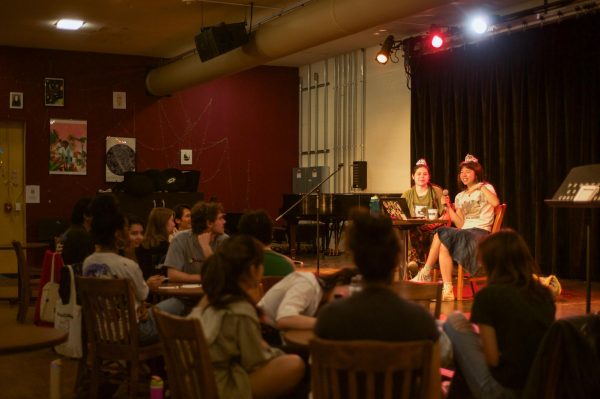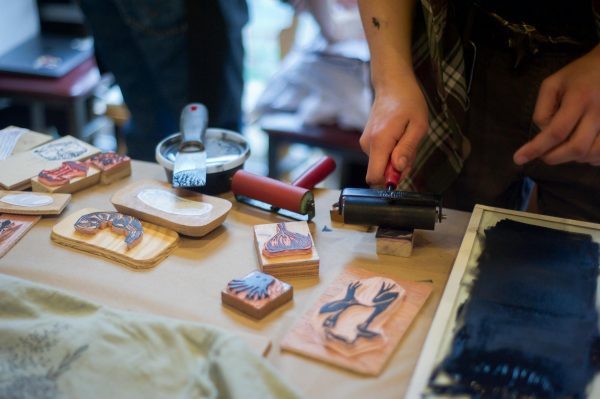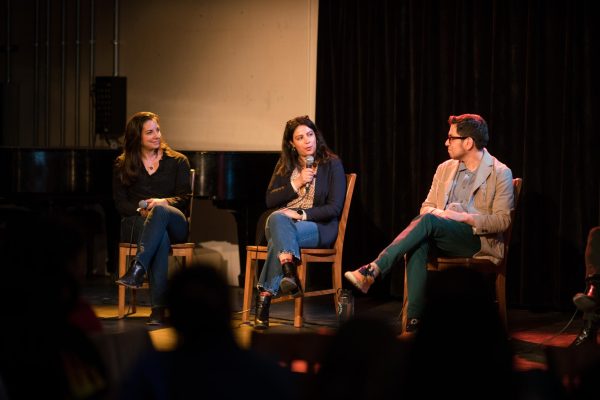Students Explore Intersests, Develop Artistic Projects for Winter Term
For many Obies, Winter Term is the perfect chance to finally sit down and get to work on that novel, screenplay, or short film they have been itching to create. While Oberlin’s Cinema Studies, Creative Writing, and Studio Art departments provide students with new ideas, skills, and inspiration, it is often hard to fully focus on the creative process during the semester. Winter Term is an opportunity for students to give artistic projects their undivided attention.
“I wanted to synthesize things that I’d learned in my first semester here,” College first-year Vivian Wolfson said.
Wolfson spent Winter Term at home writing a twenty-page screenplay and working on pre-production for a film she intends to make this summer. The film is a drama that revolves around the relationship between two mothers and their daughters, exploring themes of motherhood and femininity. Wolfson began to work on the concept before the start of Winter Term. She developed characters by writing fictional letter correspondences between the people involved in the story. During Winter Term, she completed the screenplay, storyboarded the project, and made a visual style pitch deck — a keynote composed of stills from preexisting films intended to show possible investors what the finished movie might look like.
College first-year Sam Kennedy spent Winter Term working on his first novel, a “high fantasy romance with 20th-century technology.”
“[My] project gave me vital knowledge for the future of my career as a writer, reaffirming my passion for the craft and letting me know that I do, in fact, have the stomach to write very long things,” Kennedy said.
Kennedy wanted to finish a first draft, but ended up getting only a quarter of the way through.
“Loose self-discipline is my greatest obstruction to progress,” Kennedy said. “I was distracted too easily, lifted weights to feel productive when I should have been writing, took my dogs on walks with the intent of brainstorming and the result of daydreaming.”
However, Winter Term also gave writers opportunities to discover what worked and didn’t work.
“I’d wake up and make my coffee and write for two hours and then go on with my day,” Wolfson said. “[Trying to write all day] never has worked for me … but giving myself a condensed period every single morning seemed to work out pretty well.”
College first-year Cole Mirman, who worked on a science-fiction novel about futuristic politics, had similar insight.
“The main thing I learned is that having a set schedule and keeping track of your progress is really helpful for letting you be consistent in the amount of work you get done and allowing you to stick with it,” Mirman said. “If you work every day, even if you don’t do that much each day, that will still add up over time and you can still get a lot done.”
Mirman also spoke about the obstacles he confronted.
“[Winter Term] did challenge my aspirations,” he said. “I definitely had some difficulties. There was one scene that just took me forever to figure out.”
Despite its challenges, the creative process is very rewarding.
“I think working on my project was a reminder of how deeply art can resonate with people,” College third-year Cecil Pulley said.
Pulley created a zine consisting of drawings, comics, collage, and writings reflecting on their life.
“It’s about me and my transness, and transgender things in general,” Pulley wrote in the introduction. “At least it probably is. I’m writing this before I get started, so I can’t exactly be sure.”
Pulley said he was surprised when people responded so positively to his work.
“I wasn’t drawing or making things with the purpose of being relatable or even with any certain audience in mind, so it was really touching to hear that my peers connected with it,” Pulley said. “Being able to authentically create is really uniting, as is seeing yourself and experiences like yours in art and artists you admire.”
For some students, Winter Term has been an opportunity to immerse themselves in an art form they had no experience with. College third-year Creative Writing major Ale Jorge, for example, wrote and directed an audioplay despite having no experience with directing, recording, or producing.
“I have and will continue to describe this as the most ‘building-the-plane-as-I’m-flying-it’ project I’ve ever done,” Jorge said. “From auditioning actors to directing them and recording scenes, nothing except writing the script was anything I’ve done before.”
The audioplay, titled W, for Wizards, tells the story of “three college-age wizards who face off against mysterious forces of evil.” Jorge came up with the characters last spring and started working on the script before postponing the project until Winter Term. This January, he finished the script, then used microphones checked out from the Center for Information Technology and recording spaces in Mudd Center and Kahn Hall to record W, for Wizards. He learned a lot from people he collaborated with, especially his project partner, Double-degree third year Ryn Lazorchak, who edited and produced the audioplay. The production will be released on YouTube and SoundCloud soon.
All the artists I talked to agreed that Winter Term was challenging yet rewarding.
“If you’re reading this and you want to be an author, start writing that book you’ve been thinking about,” Kennedy said. “If this Winter Term has taught me anything, it’s that you can’t know if you can fall in love with something until you’ve spent enough time with it.”








